On a normal day, over 40 million Americans struggle to provide enough food for their families. The COVID-19 pandemic has amplified this need, with food banks across the country experiencing more people needing assistance. Farmers, especially dairy farmers, are experiencing their share of challenges across the country.
Despite the challenges they continue caring for the animals, protecting the land and upholding their passion for feeding people. As schools and restaurants began closing due to COVID-19, dairy farmers in the Dairy MAX region and across the country recognized opportunities to nourish their local communities.
When a Colorado dairy farmer heard about the strain local food banks were experiencing, he turned to Weld Food Bank in Greeley, Colorado where a donation could reach the most people in need in their area.
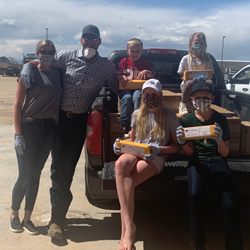
The Diepersloot family - Adrian, Jaclyn, Brooklyn, Cade, Mina and Tyce (Photo Credit: Wolf Creek Dairy)
Adrian Diepersloot, a third-generation dairy farmer and owner of family partnership Wolf Creek Dairy, initiated a $10,000 donation to provide 3,325 pounds of cheese to Weld Food Bank. To him it only made sense to donate in the form of nutritious dairy foods he produces, like many other dairy farm families across the country are doing.
“Many farmers are struggling to stay afloat, but they keep showing up and working hard for a cause they believe in,” said Diepersloot. “Our family wanted to give this cheese not only to satisfy an immediate hardship in our community, but also shed light on the fact that dairy farmers will continue to be here for people in need until we cannot anymore.”
The entire family all spent Good Friday helping load the boxes of cheese into delivery trucks headed for Weld Food Bank. To Diepersloot it was a special moment for his children to experience giving back during these times.
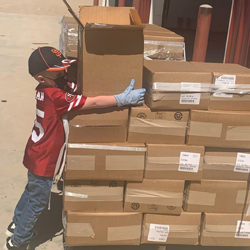
Tyce Diepersloot, 4, loading boxes of cheese (Photo Credit: Wolf Creek Dairy)
But to Diepersloot, his donation is part of a larger story – one of dairy farm families across the country who continue working hard to feed their communities.
“Dairy farmers play a crucial role in providing affordable and nutritious food to a hungry world,” he said. “And I want to personally express gratitude and admiration for my fellow farmers.”
Weld Food Bank distributes donations to the community through mobile food pantries, senior feeding and more. Last year 13.6 million pounds of food were distributed, with dairy and meat making up 74%. According to Bob O’Connor, executive director of Weld Food Bank, partnering with local farmers helps make this all possible.
“These are incredibly generous donations at such a critical time in our state,” O’Connor said. “Just yesterday morning a mom came into the food bank asking if we had milk for her children. Thanks to local farmers we can now help her and countless others who have children at home for the remainder of the school year.”
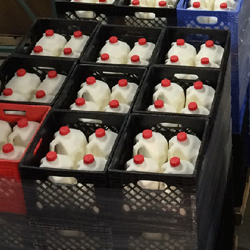
Working together is also not a new concept for dairy farmers. This held true when the Hutterite colonies of Montana organized a plan with the greater agricultural industry in the area to donate 12,000 gallons of milk to Montana Food Bank Network.
Krista Lee Evans, Montana Milk Producers Association representative working on behalf of the 29 colonies, says the Hutterites wanted to do the right thing for those in need. The milk donations started this week and will be distributed across the state over the next month.
“The Hutterite colonies know it’s important at all times, especially in times of need like we’re facing right now, that people who need healthy protein have access to milk,” said Evans. “The Hutterite farmers and others who work to supply milk to the people of Montana are making sure it gets in the hands of those in need.”
When leaders of the Hutterite colonies recognized the need to get milk to their community, it took less than two days for them to convene key partners to help make it happen. Cargill Animal Nutrition offered to cover costs for processing the milk and Meadow Gold Dairy, one of two companies processing milk in Montana, paid for packaging and delivery.
Ken Bryan, dairy technical specialist for Cargill, shared that the relationship between his company and the Hutterite colonies goes back over 30 years. When they approached him about Cargill covering costs of processing the milk, it was a no-brainer.
“This is what we’re about,” said Bryan. “We rely on the sustainability of farmers and ranchers across the country, and they rely on their local communities.”
Montana Food Bank Network, distributes to food across the state, and according to Bill Mathews, chief development officer, they are moving three times the amount of food than normal.
Before the COVID-19 pandemic, many farm families were already giving back to local food banks and pantries. Tom Alger of A-Tex Dairy in Friona, Texas spends one Tuesday each month volunteering to box food for his local food pantry and donates dairy product when he can. To Ellie Cnossen of Cnossen Dairy in Hereford, Texas, helping feed her community has become a mission after learning about the small amount of milk available through food banks and pantries. Cnossen tries to donate at least 20 gallons each month to her local pantry.
When some retailers started placing limits on milk due to COVID-19, both farmers acted quickly to secure enough milk for the pantries to ensure they had enough.
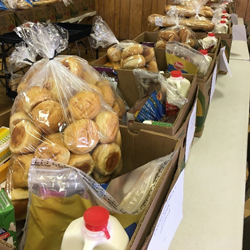
Milk included in food boxes at Friona food pantry (Photo Credit: A-Tex Dairy)
“I don’t like to see hungry people, especially hungry kids,” Alger said. “I get a lot of payback when I see kids have the biggest smile on their face when I hand them the box. And with the gallons of milk I got more smiles and thank you’s than ever before.”
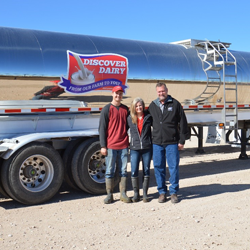
Cord, Ellie and Jim Cnossen (Photo Credit: Cnossen Dairy)
Cnossen also arranged a donation for every student at their local school to receive a gallon with their breakfast and lunch meals.
“Most of us don’t worry about when we’re going to eat,” Cnossen said. “If I can make one thing easier for people, I want to do that.”
University students remaining on campus and experiencing job losses during the shutdown are another group in need. At Midwestern State University in Wichita Falls, Texas, milk is the most requested item at their student food pantry but least donated. Jackie Hoegger of Hoegger Brothers Dairy and advertising firm Hoegger Communications jumped at the opportunity to bring local dairy farmers together to give what they could to supply enough milk for the students.
Farmers in the Windthorst and Scotland, Texas area have donated enough money to supply over 200 gallons. Hoegger says from $5 to $100, the donations continue being added to the “milk pile”.
“As much as they are going through right now, they are managing to give,” Hoegger said.
And that is what dairy farmers will continue doing – sustaining their communities for future generations, no matter what comes their way.




